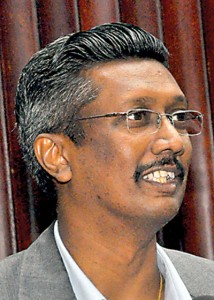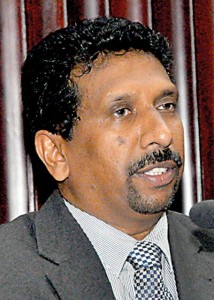News
Media urged to be a part of climate action
View(s):The media have been encouraged to become a key stakeholders in informing Sri Lanka of the dangers of climate change.

The panel of speakers. Pix by Priyantha Wickramaarachchi
Participants at a forum have bemoaned the lack of interest among news editors on the subject.
Dr. Sunimal Jayathunga, director of the Climate Change Secretariat of Sri Lanka at the Environment Ministry said last week: “Over the last century the Earth’s temperature has gone up by 1 degree Celsius. Although this may not sound a high number, the impact of this is felt on people, wildlife, eco-systems and man-made infrastructure. Small islands are among the most affected due to rising sea levels,
He was speaking at a media forum organised by the Ministry of Mahaweli Development and Environment, together with the United Nations Development Programme and the consortium partners of the Third National Communication On Climate Change to engage media institutions on the topic and increase reporting.
The forum was a part of the “Sri Lanka Next – A Blue Green Era” initiative. The consortium partners are the Sri Lanka Press Institute, SLYCAN Trust, Janathakshan and Integrated Development Association.
Dr. Jayathunga said that climate change or global warming refers to the process by which our planet heats up due to greenhouse gases in the atmosphere.
“The effects of climate change means some species are at risk of extinction. You see people forced to relocate due to unlivable conditions. Sri Lanka has seen the effects of these immensely increase in the last three years in the form of severe droughts and floods.”
Kumar Lopez, chief executive of the Sri Lanka Press Institute, said that critical communication on climate change is important to change our culture and views on the climate and the environment.
“The purpose of this forum is to understand the intricacies and challenges the media finds today when communicating climate change stories,” he said.
A panel discussion was also held on communicating climate change and the importance of raising awareness.
The panellists were Dr. Sewwandi Jayakody, a consultant for the Environmentally Sensitive Areas Project, Kusum Athukorala, chair of NetWater and the Sri Lanka Water Partnership, Malaka Rodrigo, an environmental journalist for the Sunday Times, and Arun Arokianathan, consultant editor of Athavan TV. It was moderated by the head of the Sri Lanka College of Journalism, Shan Wijethunga.

Kumar Lopez

Dr. Sunimal Jayathunga
“It is important that we turn climate change stories into stories that matter, and that’s where we as scientists fail,” said Dr Sewwandi Jayakody. We fail to communicate it in a way that touches the heart and soul of the people.” She suggested this was where the media could step in.
She also said it was important for policy makers to communicate with the community.
“It is necessary to write about climate change in ways people can relate to,” said Mr Malaka Rodrigo. “A good example is how a report in India was published where it was shown that an increase in chikungunya was due to climate change.”
Arun Arokianathan said it was sad to see how very little priority is given to climate change by the media.
“Right now, what is happening is sad. Most editors and news directors, especially in the television media, say they are full up with political news and that they have no space for news on climate change because it lacked demand. This should change. Editors should not think they could decide on behalf of the public that climate change stories lack demand. This is especially important in a world with powerful leaders like Donald Trump who call climate change a hoax. He also says he has a natural instinct for science.”
He said the media should counter such claims and keep the people informed of the facts.
“The time has come to get away from traditional thinking and a conservative approach to the matter,’’ Kusum Athukorala said. “Mobile phones can be used more effectively to convey the message to the public. We should also contemplate whether a forceful insertion of climate change into young students’ syllabuses is needed.”
She explained that to get politicians interested, it was necessary to appeal to their voters. “If the voters face problems of climate change and are forced to move out of an area, it affects the politicians vote bank. This will draw their attention to the issue.”
Vositha Wijenayake, Executive Director of SLYCAN Trust, presented the draft communication strategy on climate change for Sri Lanka.

